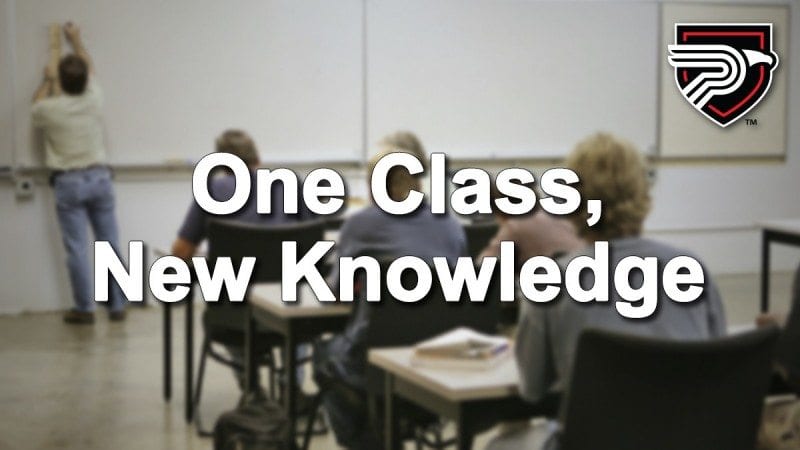One Class, New Knowledge: How a Haircut and an Onion Can Change the Way We Argue

An education is built over time, assignment by assignment, lecture by lecture, course by course, semester by semester. Between registration and graduation, every day of a student’s education is a building block, a pivotal piece of their degree. One Class, New Knowledge is a series of stories that captures the learning that happens on a single day in a single Polk State classroom.
“This isn’t just a haircut. Can you see how it’s really an onion?”
It’s a Monday evening at Polk State Winter Haven’s Fine Arts Building, the day’s sunshine fading fast through his classroom’s ceiling-level window, when Professor Howard Kerner utters this strange phrase.
A class visitor scrunches her eyebrows in confusion, but the students in Kerner’s Interpersonal Relationships course are unfazed, nodding in eager agreement.
As they’ve learned this semester, in relationships, a haircut can easily be an onion.
Kerner has been making his haircut-onion metaphor for more than two decades, at the helm of a course that has become a favorite among Polk State students.
He created Interpersonal Relationships in 1991, two years after he joined Polk State’s faculty. An English professor by title, Kerner found that many of his students were coming to him during office hours not to discuss reading assignments or essays, but for advice on getting along with boyfriends, moms, or bosses.
“I think they looked to me for paternal, professorial, old-age wisdom,” Kerner said.
“But what they really needed was the help of someone older, wiser and unemotionally involved. I thought, ‘What if I created a course on the most common relationship issues.’ If I can teach my students at 21 what I learned at 41 or 51 — think of how many more happy years they will have.”
Creating a course to address the most common relationship issues wasn’t as daunting a task as it may seem, Kerner explained, because most issues stem from a handful of root causes — low self-esteem is a big one, poor communication is another.
Which gets to the point of Kerner’s Monday night lesson — and the haircut and onion.
Kerner employs a variety of video clips in Interpersonal Relationships, allowing students to examine the way people interact with one another and the myriad mistakes they make in doing so.
On Monday, Kerner kicked off his lesson on effective communication during conflict with a 1995 clip from The Phil Donahue Show.

Professor Howard Kerner
In the clip, a dating couple discusses their heated arguments about the man’s haircut. Every time he visits his hairstylist, all heck breaks loose. Doors are slammed, names are called, and threats to end the relationship are made.
On the surface, it’s all because the woman doesn’t like the haircut, saying it “turns her off.” But as the show continues, and a psychologist and numerous audience members weigh in, it becomes clear that the couple is really fighting about the future of their relationship. She wants to marry. He’s reluctant because she has four kids. She’s scared he’ll leave her behind.
To her, cutting his hair the way she wants is symbolic of his loyalty.
Thus the “haircut” is really an “onion” — with new layers of conflict in the relationship revealed as the discussion deepens.
“One of the most important aspects to remember about conflict resolution,” Kerner said to the class. “is that whatever you’re fighting about doesn’t have anything to do with what you’re really fighting about. We fight about topics not issues. The topic is emotionally neutral. When it gets down to the real issue, that’s where our egos are on the line.”
Kerner brought the difference between fighting about topics and issues home to his students with a number of examples.
A marital spat over the husband forgetting to buy the milk or pick up the dry-cleaning? It’s probably really about the wife feeling he doesn’t listen or care about what she has to say.
A mother who pulls a guilt trip on her teen just as he’s heading out with friends? She’s not trying to ruin his night; she just wants him to make time for her.
In these situations, and so many similar conflicts we all encounter daily, it is important to argue by the rules, Kerner discussed with his class. Stay on subject, don’t bring up everything you don’t like about the person, seek compromise, and forgive when the fight is done.
As the evening progressed, Kerner’s students punctuated his lecture and videos with reactions such as “aha,” or knowing chuckles, even a couple “sounds like my relationship.”
For student Will Creach, Interpersonal Relationships has changed the way he interacts with both his 13-year-old daughter and clients of his wedding-planning business.
“Like with my daughter, instead of saying, ‘Why haven’t you cleaned your room? I’ve told you 10 times to clean this mess,’ I’ll say, ‘Why would a clean, good-mannered kid have such a messy room?’” said Creach, 42, a resident of Auburndale, who is pursuing his Associate in Arts degree.
“I start with a compliment to make her listen, rather than shut down. By taking a softer approach, I open a door and let people walk through it instead of pushing them through it.”
Creach added he also found the course’s section on body language helpful and relevant to interactions both in his personal and professional life. According to Kerner, 93 percent of communication is done non-verbally, so body language is a huge segment of the course.
Like Creach has found, everything that’s discussed in Interpersonal Relationships has immediate real-life application. It’s one of the reasons Kerner has loved teaching the course all these years.
“It could be called Introduction to Life,” he said.
Interpersonal Relationships appears in course listings under SLS 1250. It is an elective for all curricula. Kerner will be offering day and evening sections of Interpersonal Relationships in the fall. For more information, contact him at hkerner@polk.edu.

